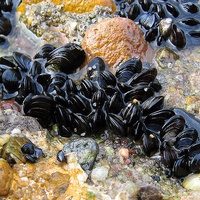Why are New England's wild blue mussels disappearing?
Science Daily, 25 Aug 2016.
The Gulf of Maine coastline, historically home to one of the richest shellfish populations in the US, is undergoing a dramatic change, with once-flourishing wild blue mussels all but disappearing, according to ecologists. Read the story at Science Daily.
The Gulf of Maine coastline, historically home to one of the richest shellfish populations in the U.S., is undergoing a dramatic change, with once-flourishing wild blue mussels all but disappearing, according to a study led by University of California, Irvine ecologists.
After comparing contemporary survey data with 40 years of historical benchmarks, Cascade Sorte, assistant professor of ecology & evolutionary biology at UCI, and colleagues from around the U.S. report that the blue mussel numbers have declined by more than 60 percent along the gulf coastline, which stretches from Cape Cod north to the Canadian border. The mussels used to cover as much as two-thirds of the intertidal zone, but they now cover less than 15 percent.
Among the suspected reasons for this are warming oceans and increased human harvesting, Sorte said. Elevated air and water temperatures push the mussels out of their comfort zone, heightening physiological stress and, ultimately, mortality rates. Study results appear in Global Change Biology.
Continue the story at Science Daily.












